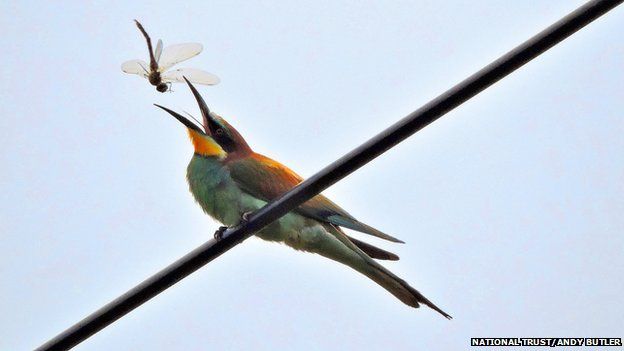Rarely seen bee-eater birds breeding on Isle of Wight
- Published

A pair of bee-eater birds, native to southern Europe, has been discovered nesting on the Isle of Wight.
The National Trust said they were only the third pair to breed successfully in the UK in more than a century.
The birds were discovered on the Wydcombe Estate on the south of the island 12 days ago and wardens think their eggs have now hatched.
It is thought the unusually warm spring and summer have lured a larger number of bee-eaters to southern England.
Ian Ridett, National Trust ranger on the Isle of Wight, said: "We have set up a 24-hour surveillance operation around the site to protect these rare visitors, as any un-hatched eggs could be a potential target for egg thieves.
"The hot temperatures since spring have helped an above average arrival of bee-eaters, with more than 10 seen along the south coast since May."
The last time a pair was recorded breeding in the UK was in a quarry in County Durham in 2002 when two young successfully fledged.
Before that, it was in 1955 when two pairs raised seven young in a Sussex sandpit.
The adult birds have been seen delivering food into the nest which indicates the eggs have hatched, Mr Ridett added.
However, the chicks are not expected to leave their underground nest site for about two weeks, so the number of chicks hatched is still not known.
Bee-eaters can burrow up to 10ft (3m) and usually lay clutches of four to nine eggs.
Matthew Oates, National Trust nature and wildlife expert, said: "The bee-eater is arguably the most stunning bird on the British list - it looks tropical.
"As our climate changes it's likely that we'll see increasing numbers of new visitors on our shores."
- Published18 December 2012
- Published8 November 2012
- Published16 May 2012
- Published4 March 2009